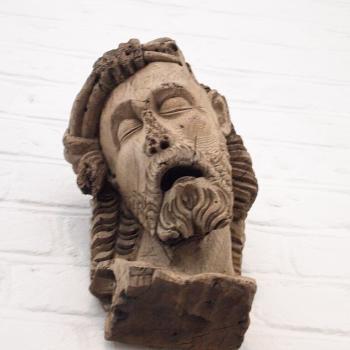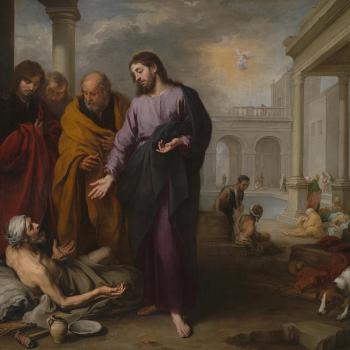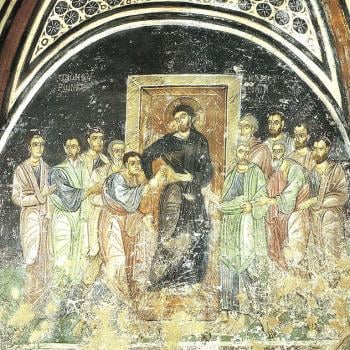
St. Paul warned us against using some external representation of the faith, however good and valuable they might be within a given context, as indications of faithfulness to God. Externals can have value. They can be used as signs and symbols of the faith. They can help explain the faith. Nonetheless, they must be used appropriately. They are to be treated like any and all disciplines. As long as they are helpful, they can be used, but when they cause undue discord, become treated as necessities, turned into idols, or the cultural context has changed so that their application and value is no longer appropriate, then it can be time to stop using them. Paul understood this in relation to Gentile converts to the Christian faith: they should not be expected to follow the law of Moses as if they were Jews. The Law of Moses was given to a particular people; to assume all that is found in that Law was meant to be universalized and embraced by everyone, undermines the special value and context in which the law was given. Yes, the Law of Moses was and continues to be a good, and even elements of it might be of universal value, but many of its particulars were not meant for everyone, for example, no everyone was meant to be circumcised. To expect all aspects of the Law of Moses to be universalized and heeded by everyone at all times is to expect the impossible; those who demanded Gentile believers in Jesus Christ to not only follow the law of Moses, but the law in its most rigid, extreme interpretation did not understand what Christ brought to the world. Christ brought us freedom beyond such legalism (and is true, not only in relation to the adaptation of the Law of Moses, but Christian discipline as well; Christ did not want such legalism to undermine the freedom and grace given to believers). Paul contested against such legalism, knowing that those who engage its line of thought tend to impose restrictions on others while finding excuses to justify why they do not follow such extremes themselves; that is, legalists tended to contradict themselves in their own actions. Such demands are made for the sake of power and control; those who make them will do enough to appear to be following the law through some external signs, but they will be far from the spirit of the law and in their personal lives, undermining it in all kinds of ways. Thus, Paul said:
It is those who want to make a good showing in the flesh that would compel you to be circumcised, and only in order that they may not be persecuted for the cross of Christ. For even those who receive circumcision do not themselves keep the law, but they desire to have you circumcised that they may glory in your flesh. But far be it from me to glory except in the cross of our Lord Jesus Christ, by which the world has been crucified to me, and I to the world (Gal. 6:12-14 RSV).
Paul knew how easy it is to appear devout and pious. Legalism is all about the externals, which is why it uses externals as a way to judge others. Legalists often use some element of the way things used to be in the past and act like it is necessary for everyone to follow it in the present. They like to claim that whatever problems exist in the present lies with the rejection of the way things were in the past. They like to depict the past in a romantic fashion, looking at it as if things were better, and so all the problems of the present would vanish if we but went back to the way things were in such a golden age. This is how and why many Catholics, misunderstanding tradition, think it is about doing things as they were in the past, at least in the past that they know and understand (a more immediate past. Thus, many of them think many things done today should not be done, such as allowing communion to be received in the hand or while standing up. They act like such changes in discipline is what caused a decline of faith in the present age. This kind of thought is naïve and shows little understanding of Christian history. When Christianity was first embraced, Christians were receiving in their hands and while standing up, indeed, the Council of Nicea especially said Christians should stand and not kneel on Sundays. Certainly, just because that is how things were done in the earliest eras of the church does not mean it is what should be done today, but it shows, if it is done today, there is good precedent for it. The point is that ecclesiastical discipline should meet the time in which it is found instead of just taking one of the more recent forms of discipline and trying to universalize it and enforce it when it is no longer helpful.
Paul, therefore, pointed out that what should connect all Christians, all believers, is not externals, and the legalistic enforcement of them, but our relationship with Christ. We are to engage Christ in order to be transformed, not just on the outside, but on the inside. We should embrace the way of the cross, that is, crucify ourselves with Christ so that we can rise up with him. Of course, we must not take such words in an extremely literal fashion, that is, we should not seek martyrdom; rather, they point to the way we are to undermine our own selfish attachment to ourselves, and through them, the way we try to impose our inordinate will upon the world. We must give up power and control, trying to force our ways upon others. We must not succumb to any of the temptations which Jesus experienced while in the desert. We should die to the self so that we can rise up in Christ and become, with him, vessels of grace in the world instead of being unjust tyrants hurting those around us with our unjust expectations. We are to be the bearers of peace, just as Paul wished peace upon his readers. “Peace and mercy be upon all who walk by this rule, upon the Israel of God” (Gal. 6:16 RSV). God, therefore, did not create or establish any particular law to help would-be tyrants, but rather, to as a means of engaging people where they were at, to help prepare them to receive love, mercy, and grace. For God does not want to use the law to condemn people, but to help them, to lift them up, and this is exemplified in the incarnation, where the fullness of God’s intents are revealed: “For God so loved the world that he gave his only Son, that whoever believes in him should not perish but have eternal life. For God sent the Son into the world, not to condemn the world, but that the world might be saved through him” (Jn. 3:16-17 RSV).
We are to look upon the cross. We are to see it as a sign of love, of what God is willing to do for creation, showing that God loves us so much, God allowed humanity do all it wanted to do to Jesus as a means of letting go of all its hatred and anger so that it can finally find peace. It is a sign of love and so we should embrace the cross, not as a sign of power, not as a tool for violence, but as a representation of the way we are to live our lives, to give ourselves over to others out of love. The cross is to be elevated so that we can exorcise from ourselves the demons inside, those serpents which would bite us with their poison of hate, greed, and of egotism. The more the cross is lifted up by our actions, by our embrace of its meaning, the more those demonic powers will be overcome. We must embrace love, charity, and so deny ourselves, that is, deny any way of lifting ourselves up above others to tyrannize them. In doing so, we lift high the cross alongside Moses, who, before Christ, gave us a sign of the cross, overcoming the demonic powers which threatened the people of Israel:” And as Moses lifted up the serpent in the wilderness, so must the Son of man be lifted up” (Jn. 3:14 RSV).
Stay in touch! Like A Little Bit of Nothing on Facebook.
If you liked what you read, please consider sharing it with your friends and family!
N.B.: While I read comments to moderate them, I rarely respond to them. If I don’t respond to your comment directly, don’t assume I am unthankful for it. I appreciate it. But I want readers to feel free to ask questions, and hopefully, dialogue with each other. I have shared what I wanted to say, though some responses will get a brief reply by me, or, if I find it interesting and something I can engage fully, as the foundation for another post. I have had many posts inspired or improved upon thanks to my readers.













